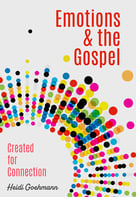Discover your wide breadth of emotions as a gift from the Creator in Heidi Goehmann’s latest book, Emotions and the Gospel. Read an excerpt about how God created your emotions to be good (even the so-called bad ones) and to mirror His own perfect emotions before creation’s fall to sin.
Emotions Exist External of You
Because emotions are personal, our beliefs about emotion can easily come from only our own vantage point. But emotions exist apart from our experience with them. Emotions originated in God before the beginning of the world, which means that emotions existed between entities before they existed between God and humans or between people. God is a connected community of three persons, or what theologians call the Godhead, mysteriously making only one God. God the Father, God the Son, and God the Spirit exhibit emotions themselves. God the Trinity has pleasure together in the creation of the universe. God the Trinity experiences joy in their fullness of being. God the Trinity was angered and saddened by humanity in Noah’s days and I’m sure in our own. And so we encounter another emotion foundation: emotions exist outside of our human experience of them, in the Godhead. Emotions are not limited to what we as humans think, feel, or understand about them.
Emotions as God Created Them
Yet, while emotions exist apart from us, emotions are an essential part of how God made us. Another piece of emotion foundation to lay down is that our emotions impact our interactions with Him and with one another. These emotional interactions have been happening since the beginning of humanity’s creation. We are people created by God with emotions. When God said, “Let Us make man” and He “saw everything that He had made and, behold, it was very good” (Genesis 1:26, 31), that included emotions. In creation, emotions were gifted to us by a good God and were called good as part of that creation. Another emotion foundation we can embrace: emotions are not inconvenient mistakes but rather gifts to be held in our hands.
Sometimes the best way to understand the beauty of a gift is to use negative imagery: to imagine life without that particular thing. … What would life be like without the ability to feel a diversity of emotions in our experiences?
Emotions Were Created for Connection
In the beginning, emotions existed perfectly. They served as connectors. Imagine the emotions of joy, awe, humility, and bestowed value and grace moving between God and humanity freely, with no disruption. Before brokenness and its hurts, the human response to God’s good gifts, including emotion, was likely thanksgiving and awe in a sense of connectedness. Imagine love and tenderness and understanding moving from human to human without all the heartbreak and tension. Emotion brings into our lives one more way for God to know us relationally and us to know God relationally. We see this perfection of emotion moving between God the Father and God the Son when the Father says, “This is My beloved Son, with whom I am well pleased” (Matthew 3:17, emphasis added). We see it when Jesus is full of joy in the Holy Spirit, praising the Father for His plans, His timing, His character (Luke 10:21).
Like the rest of God’s good gifts, emotions now exist in the brokenness of the world. Oh, how beautiful it would be if just one part of our lives could go untouched by brokenness! But the entrance of sin into the world means that sin affects everything, including our emotions. Our emotion foundation here is not only that our emotions are broken but also that we experience them in the brokenness of the world. Disappointment, fear, and sadness exist not because we are sinful but because the world is hard, imperfect, and broken. The good news is that where brokenness is evident, Jesus’ redemption is not far away.
Emotions Are Not Sinful
Jesus’ emotions during His time on the earth in the incarnation, from birth to death, were impacted by brokenness. Yet, He remained perfect. Jesus’ experience of anger and sadness, without sin, tells us again that sadness and anger are not in themselves sinful, wrong, or disconnecting. It’s easy to make emotion the bad guy here, but at what cost? Saying that emotions can lead us to sin is different than saying certain emotions are sinful. Is it possible that emotions like sadness and anger are still gifts of the Creator? How would we process a broken world without tears? How would we respond to injustice without anger? How would we keep ourselves safe from harm without fear? These things reside with us because of sin’s existence in this world, but that doesn’t cloak the entire concept of emotion in sin. Nor does it make some emotions sinful because they may only be experienced in the brokenness of the world. Unfortunately, we have a hard time imagining many of these emotions outside of our ability to make a mess of everything. While the relationship between brokenness and emotion is mysterious, God reveals much to us in Jesus Christ. …
Despite how weird and wild they can be, emotions originate within the heart of God. God proclaims all of us—heart, soul, mind, and strength—to be redeemable in Jesus Christ. We have been given these complicated gifts to connect us, top to bottom, soul to body, one to another, a gracious God to the people of His hands.
 As we move on, we’ll see more of God’s own experiences with emotion in Scripture as He responds to and interacts with humanity. We will learn about God’s emotions and build awareness of God in our emotions.
As we move on, we’ll see more of God’s own experiences with emotion in Scripture as He responds to and interacts with humanity. We will learn about God’s emotions and build awareness of God in our emotions.
From Emotions & the Gospel, copyright © 2022 Concordia Publishing House, pp. 21–24. All rights reserved.
























